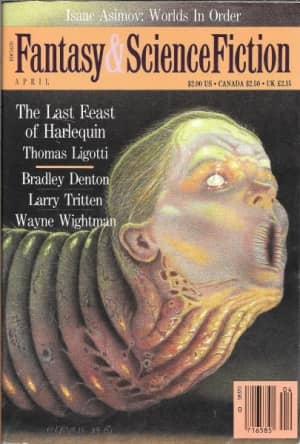Birthday Reviews: Thomas Ligotti’s “The Last Feast of Harlequin”

Thomas Ligotti was born on July 9, 1953.
Ligotti’s collection The Nightmare Factory won the British Fantasy Award and the Bram Stoker Award. He won additional Bram Stoker Awards for his novelette “The Red Tower” and his story “My Work Is Not Yet Done.” The latter work also earned Ligotti his first International Horror Guild Award. He won a second IHG for The Nightmare Factory. A translation of his collection Grimscribe: His Lives and Works won the Italia Award for International Novel.
“The Last Feast of Harlequin” was originally published in the April 1990 issue of The Magazine of Fantasy and Science Fiction, edited by Edward L. Ferman. Terri Windling and Ellen Datlow picked it up for the fourth annual edition of The Year’s Best Fantasy and Horror and Stephen Jones and Ramsey Campbell picked it for Best New Horror 2. Ligotti included the story in his collections Grimscribe: His Lives and Works. The Nightmare Factory, The Shadow at the Bottom of the World, and Songs of a Dead Dreamer and Grimscribe. Ferman and Kristine Kathryn Rusch used the story in The Best from Fantasy & Science Fiction: A 45th Anniversary Anthology. Jim Turner selected it for Cthulhu 2000: A Lovecraftian Anthology and Scott David Aniolowski selected it for Return to Lovecraft Country. Joyce Carol Oates used it in American Gothic Tales and Peter Straub included it in American Fantastic Tales: Terror and the Uncanny from the 1940s to Now. S.T. Joshi used the story in the anthology A Mountain Walked. The story has been translated into German twice as well as Italian and Finnish. It was nominated for the World Fantasy Award for Best Short Story.
Ligotti presents the research of an anthropologist into clowns in folk culture in “The Last Feast of Harlequin.” An anonymous source sends the professor a note about a strange festival in the town of Mirocaw that features people dressing as clowns. Unable to learn anything about the festival through normal sources, including exchanging letters with the state’s Department of Tourism, the professor forgets about the festival until chance brings him to the town and he learns that the festival is held during the Winter solstice, bringing it in conflict with the more traditional Christmas celebrations.
Returning for the actual festival, with very little knowledge of what to expect, the anthropologist tries to learn from the townfolk why they do what they do, only to find that every avenue of inquiry is a dead end. The villagers don’t know why they have the traditions, they just know that they follow them. In the process, he does realize that one of his old professors is living there, apparently a derelict in a part of the town, which at first doesn’t appear to participate in the festival, but later he learns does with different rules.